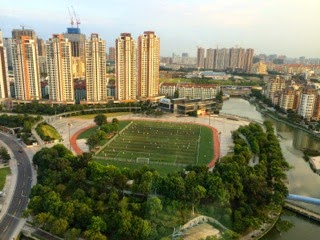I've just returned from a vacation in the Yunnan province which is in the western part of China.
 |
| http://www.chinatravelcompass.com/kunming/img/map/origin/yunnan-map02.jpg |
The Chinese have a national holiday from Oct. 1-7 so I thought I would take the opportunity to explore the part of China closest to Myanmar and Laos.
We were told that all parts of China would be unpleasantly crowded so we hoped we were choosing an area that would be off the beaten path and would give us some needed respite from the hustle and bustle of Shanghai and Kunshan.
I went with my friends Chris and Edie Allen who kindly took me under their wing as traveling companions. It was a tiring journey to get to Dali, our final destination, from Kunshan. We used lots of different means of public transportation on this holiday: taxis, trains, subway, the Maglev in Shanghai, airplanes between Shanghai and Kunming, buses, and even a motorized scooter. The journey was well worth the trouble.

Dali is a place of incredible natural beauty. Many Bai people, a minority group in China, live in Yunnan and the architecture is made of whitewashed homes with fluted tile roofs.
We stayed in a small bed and breakfast built around a central courtyard. We were warmly welcomed by Daisy, the manager, and Dali, the inn's Golden Retriever.
The Bai wear white clothing decorated with brightly colored tie dyed vests, shoes, and headdresses, with elaborate embroidery.

In one of the small towns we were fortunate to see a newly married couple being escorted through the streets by their friends. Their way was marked with loud firecrackers. The couple looked very young and very nervous.

On one day we went up by cable car into the Cangshan Mountains to walk
along the mountain trails and to visit a Buddhist temple. We had a spectacular view from the top of the ride of Dali in the valley below.
The tall spire in the middle of the photo is also a Buddhist temple, one of the Three Pagodas of Chongsheng Temple, supposedly built 823-840 AD.
We also
explored the coast of Erhai Lake, which lies to the east of Dali, and visited Xizhou whose name
means "happy village" (pop. 35,000). Xizhou is known for its Bai
architecture and was the home of many Chinese intellectuals during
WWII since it was not invaded by the Japanese.
A favorite saying of my
friend Pam George applies to this area, "Always work where the heaven
is high and the emperor is far away."
The weather was ideal and it was a welcome relief to be out of Kunshan and in a room where I could open the windows and the sky was a clear blue. We ate delicious food. Many restaurants were open to the street and they had containers piled with fresh vegetables. We could point to the ones we wanted prepared and they brought dishes simply prepared and had wonderful flavors.
Dali is about 1600 miles from Kunshan and I felt like I was in a different country while I was there. Dali was a nice change of pace from the bustling streets and highrise buildings out my hotel window.
We are moving to the DKU campus on Saturday so we are about to make this long awaited shift. It'll be another phase of this wonderful semester that offers challenges and new adventures at every turn.
 are making their plans to leave. Brian Hare and his family are going on to a sabbatical in Australia. Vicki Russell, Jeff Moe, and Hippo Tan will return to Duke. Haiyan Zhou has been given medical clearance to fly back to the US and leaves on Monday. Our DKU family will move on to a new adventure on campus.
are making their plans to leave. Brian Hare and his family are going on to a sabbatical in Australia. Vicki Russell, Jeff Moe, and Hippo Tan will return to Duke. Haiyan Zhou has been given medical clearance to fly back to the US and leaves on Monday. Our DKU family will move on to a new adventure on campus.


































